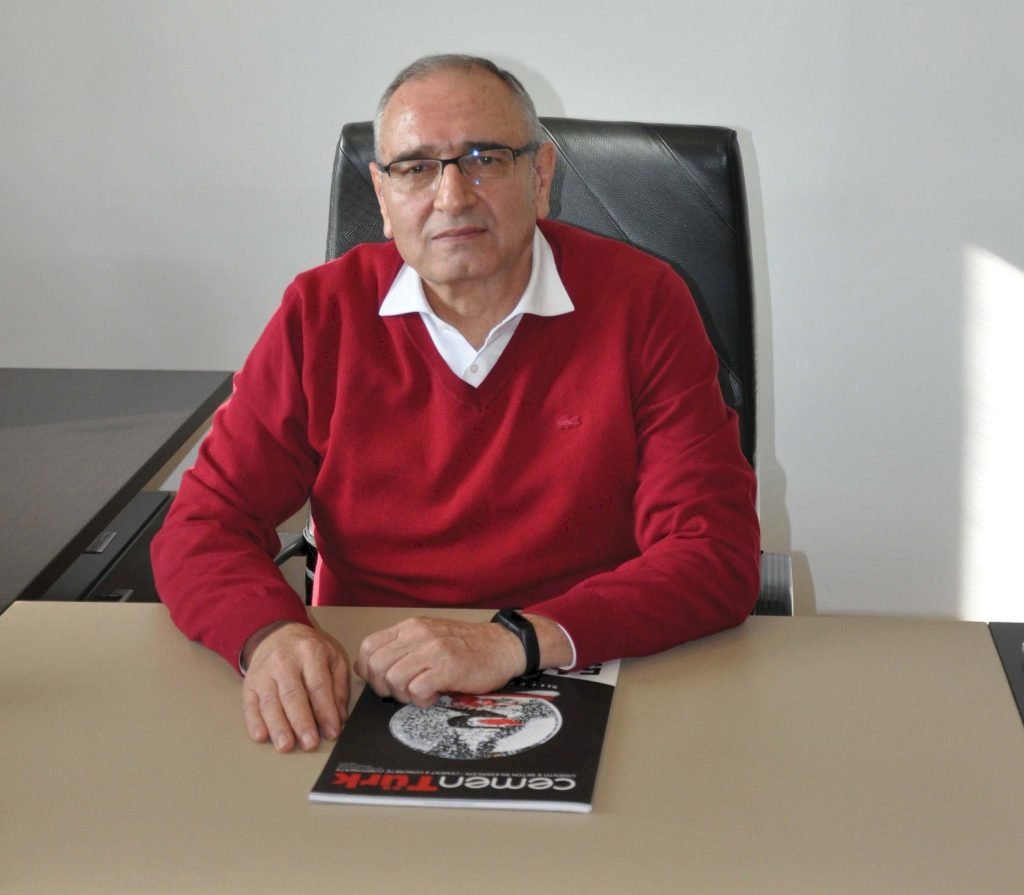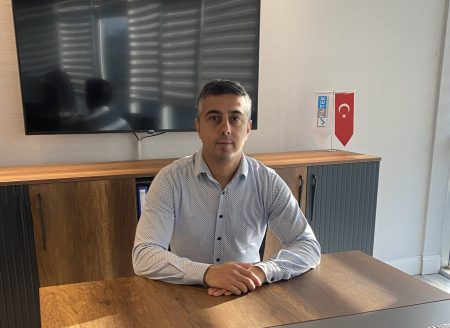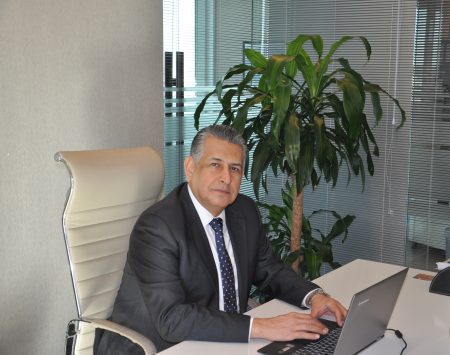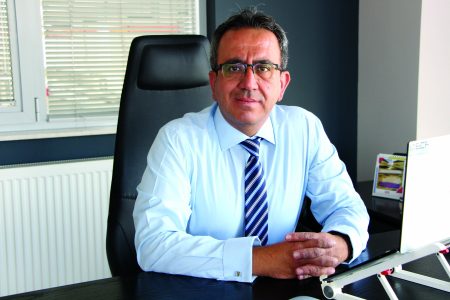A leader who devoted more than half of his life to the cement industry. He has been working in every sector of the industry for 36 years. Turkey and nature lover. You understand from the sights of the employees that he is not only an administrator, but also the father figure of all of them. He has done all his work with love and continues to do. When we ask the question “What do you suggest to our young friends in the cement sector?” gives a single answer, ‘Love your country, people, nature and your job.’
Now he’s ready and committed himself to make Limak Cement a global player. With Limak Cement Group CEO Gültekin AKSÜYEK we talked the Limak Cement, Turkey, the cement sector around the world and his future plans.
Will you tell us about Limak Cement? In 19 years we’ve grown up to 19 times. We started with $25 million turnover. In 2019 we will reach a size of $4 billion. We are a cement group that grows so fast and that serious.
We did not make any investment by chance. When I started to work in Limak, we agreed with Mister Nihat Özdemir to invest in new factories or to do new investments in factories within 5 years at the latest. At the end of 5 years we got Gaziantep, Ergani and Urfa. So we made a very planned growth. We made investments that have returns. We have our cement factories in 7 different regions. Therefore, we were able to compensate the regional problems of the cement sector with positive regions within the group. This is a huge influence in our growt h.
After we set our target market for Africa, we set up our first facility in Mozambique and we got a market share above our targets. After that we started to invest in Ivory, will be commissioned within 1 year.
Our goal here was to become a global player. We set this target in 2005. The Turkish cement sector has gaps in this area. The Turkish cement sector has always been intensified and occurred surplus supply. There have not made any investment for becoming a global player. When we saw this, as a group we grab the bull by the horns. Our portfolio also has new countries. We are conducting studies in South America. We do not start investing until we have finished an investment. After finishing each investment, we will start to other. We will keep the chain unbroken.
New investments can be through purchasing, new plant building or grinding and packaging plant. I even say that we are a customer to a cement factory which is on sale if it is in a location that we desire. We can make a purchase even tomorrow. This is current for Turkey and also for other target markets.
“Limak will be the global player in the cement sector” this is our goal.
The Limank Group is settling in Africa. As a group of cement we are going first and then the construction and energy group will come. For example, we built the airport in Senegal and we finished and commissioned it in 8 months.
So we are actually going ahead like “akıncı bey” (a strong group of soldiers from turkish history). We learn the system, the legislation, the law, the public, the infrastructure there and give it to our group. After accompany us the other sectors of our group. We will always be in Africa.
Why do you care so much for the African market?
Africa, with its underground treasures, market potential and human population, is the latest source for the world to consume. Not just for us, I say to all sectors in Turkey, we have to invest in prestigious locations in Africa. If we are late, those locations will be filled by others. For example, China is very ambitious in this regard. I do not just talk about cement, I speak for all sectors. We have to act very quickly in Africa in all business activities that address humanity. Energy, housing, mining, we need to act immediately. Unfortunately, I see that we are a little late. Our industrialist does not work hard in this regard. All of our companies, while planning for the future, should extend beyond Turkey. We have to be in the right places, at the right time.
What comes first in your mind while saying cement industry in Turkey?
The cement sector has not paid much attention to the environment in the past. Because we do not care about the environment, our image is bad. Nowadays, of course is not like that. At the moment, the cement sector is one of the least environmentally influential industrial sectors. Because all the factories are rehabilitated and all emission values set by the EU are being applied and can be instantly controlled by the ministry of environment. However, if we do not tell the mistakes made in the past will be unfair. The image of the industrial factory, which came out dust from its chimney, damages its surroundings and adversely affects human health, is always stay in the minds. And especially we can not turn off this 30 years old image with the beautiful things we do now. Because people froze this image in their memories. There is a false perception for all industrial facilities in Turkey. As Turkey we need cement. If you enclose the industrialist’s way with a thick wall under the name of environment consciousness, the name of environmentalism, the cement industry does not develop in this country, neither iron, steel nor energy. However, what needs to be done is; you will be allowed to invest in the right places. You will make arrangements in which the industry will not harm nature in that area. It does not matter if you’ve done these.
There is great reaction to limestone and quarries. But without a stone quarry you can not build a factory. Where will you get the stone? Will we bring the raw material of the cement, limestone, from abroad? For example, in Istanbul, there is demand surplus. It needs cement. For Istanbul will we bring the cement from abroad? We pay a price for each product we bring from abroad. We use the resources of our country, foreign currency. While we have gone so far in cement production and technology, will we bring cement from abroad when there are such investments? Must be given the permission for investments in the right place. After using the rocks in that mountain, we have to rehabilitate and leave the nature as we found it. If a thousand olive trees are cut for the industry, you will plant 10 thousand olive trees. Instead of doing these things, it is not a solution to take a stick to your hand and hit the industrialist’s head. We will first say nature, then industry, and find ways of protecting both.
The past of the industrialist is bad. But now there is no industrialist like that. We became conscious and changed. We need to talk with people about this. This is of course not enough. We need to make the right investments in the right places. Because we have to invest in this country, to produce workplaces and food. If you bring any difficulty in making this investment, the industrialist will run away and invest abroad. If you want to invest in China today, you will receive all your documents in 1 month. To invest in Turkey you need to bother 1.5 – 2 years. Will an industrial investment for legislation and permission be delayed by 2 years? This needs to be questioned. We need to get rid of this cumbersome bureaucratic structure in Turkey. Of course something is changing. We are making progress, but certainly not enough. For example, we worked 2 years to make an investment in Kilis. However, Kilis is not given incentives. Kilis is feeding more Syrian than his own population. While the most incentive should be given here, is it fair to trouble so hard to invest? The people in this place need work and food. Procedures must be carried out very quickly for bot h domestic and foreign investors.
For example, I would like all the environmentalists to see our Kurtalan factory. Let them go there and figure out what we’re doing. We are doing viniculture and have pistachio trees right now. We planted 8,000 pistachio trees. My purpose here is to explain: Cement is not an industry which is the enemy of nature. You can grow all the products at the cement factory’s garden. I have proved that. We did it with the people of the region. We trained those people and expressed ourselves well. After we gained their trust, we achieved that all together.
Cement has a negative outlook in Turkey. Because of this view, the competition institution is constantly unfair to cement companies. However, Turkish cement has become a serious brand all over the world. We export cement even to Europe and to the US. As technology, we are at the level of the advanced countries of the world. We are the largest cement producer in Europe and the top five in the world. If the problem of Syria and Iraq is solved, the Turkish cement industry will open much more.
What do you suggest for your young colleagues?
1. Love your country, love your job, love the people.
2. Nothing happens without love.
3. Respect the environment.
4. Be aware of the size and power of the Turkish cement industry. Own this size to be a global player in the world and move it forward.
5. Stay in a profession. Do not change jobs often.
In the years that we started, the cement sector was very difficult. Now with automation we can produce cement much more comfortably. Today, young people are not so curious about such things. They want to work in more comfortable jobs. Two years later starting work they want to become a manager, they want to get all kinds of social opportunities quickly. But the world is not like that, they realize that and regret it. Young people should be permanent in a profession. They should not change their jobs very often. It is very important to choose a profession and continue there. This is Turke y’s bother.
Should we talk a little about numbers, what is the size of Limak Cement, what kind of structure are we talking about? What is the turnover, the number of employees and your position in the sector?
Our company in Turkey and Africa is operating with 11 cement factories, 23 ready-mix concrete plants, 1 BIMS block plant and 3 R&G centers with international accreditation certificate. In Turkey and sub-Saharan Africa, we have 1.656 young and dynamic permanent employees, also with employees working at our investment activities in 2017 together with sub-employers we have created over 3,000 employments.
Our company, with factories spread into a large surface area in Turkey, has a market share of 12% from cement production and 11% from clinker production, with 14.9 million tons of cement and 8 million tons of clinker production capacity Turkey has the second largest capacity in cement sector. Moreover, as the results of survey Turkey’s Top 500 Industrial Enterprises prepared by the Istanbul Chamber of Industry (ISO) is the second sector.
In Turkish market we continue our sustained and balanced growth with strategic investments…
• Ankara New Integrated Cement Plant – Ankara – Turkey:
In Ankara, Polatlı district, the ongoing investment of 1.8 million tons production capacity Ankara Integrated Cement Plant is continuing at full speed; we are planning to put into use our plant in the first quarter of 2018.
• Kilis New Integrated Cement Plant – Kilis – Turkey:
We have completed within 2017 the investment financing process of our Kilis Integrated Cement Factory with a production capacity of 2.3 million tons, strategically located close to the Syrian border. By accelerating the construction and assembly activities in 2018, we aim to put into use our factory in the second quarter of 2019.
• Balıkesir New Furnace Line Project – Balıkesir – Turkey:
We have already begun the construction of a second rotary furnace line within the 925,000 ton clinker production capacity factory. Our goal is to increase the total clinker production capacity of our factory to 1.8 million tons by completing the project in 2019.
• Thrace New Furnace Line Project – Pınarhisar – Turkey:
In the factory, which currently has 2.2 million tons of clinker production capacity, EIA positive document has been taken for the new rotary furnace with 1.4 million capacity and basic engineering project works have been started.
• Muğla New Furnace Line Project – Muğla – Turkey:
For the investment of Muğla Integrated Cement Factory, with a production capacity of 1.6 million tons with a strategic position in the Milas district of Muğla, EIA positive document has been taken and project works have been started.
We are becoming a global brand with sub-Saharan Africa investments…
Our factory, established in Maputo, the capital city of Mozambique, in the port area of Matola within an area of 80.000 m2, started its sales activities in the last quarter of 2016. At the end of the first operation year, the factory with a capacity of 0.7 million tons cement grinding facility reached 25% of the regional market share and became one of the three biggest players in the country.
On the other hand, we are planning to put into use our grinding-packing and ready-mixed concrete plant (Limak Africa SA) which its installation is continuing in Ivory Coast Abidjan, with 1 million tons of cement and 1 million cubic meters of ready mixed concrete capacity in the last quarter of 2018.
By the end of 2018 we will have reached 1.7 million tons of capacity in Africa. As Limak Cement we are the leading group in the continent. On the other hand, we are in a strong vertical integration relationship with Limak Holding’s construction, investment and energy companies. The positive results of this integration will manifest itself in the middle and long term.
On the other hand, we continue our search for new markets, especially in Sub-Saharan Africa and South America. In addition to this we are constantly monitoring opportunities for purchasing in international markets.
What kind of developments are you expecting in the cement and construction sector in the short term at domestic and abroad?
Contrary to expectations, especially in the last quarter of 2017, economic activity in the global economy is showing positive performance and improvements are continuing. In this context, the OECD predicted that the world economy would grow by 3.6% in 2017, and for 2018, increasing this prediction 0.1 grades, predicted as 3.7%.
World cement production has increased by 2.3% in 2016 and it is predicted that by 2017 production will increase by 0.8% and will reach to 4.2 billion tons.
Infrastructure investments in Turkey are supported by a variety of employment and tax incentives. Especially within the public private sector cooperation model, the mega infrastructure and transportation projects are ongoing rapidly.
As of the first nine months of 2017, gross domestic product increased by 11.1% compared to the same period of the previous year; while the construction sector turnover index increased by 27.1% compared to the previous year.
I think the reason that abovementioned investments will continue in 2018 and in the following years will keep the construction and therefore the cement industry dynamic and the growth in the domestic cement market will be about 5%.
How was the year 2017 for the name of your company? How far the sector grown up and how much did you grow up? With which goals did you start this year?
In Turkey, 66 million tonnes of cement has been sold by the end of October 2017 and 77 million tonnes of cement is foreseen for the end of 2017. During the first 10 months of 2017, the cement production went up by 3.1% while the clinker production increased by 2.8% compared with the same period of the previous year. 10% of the produced cement was exported in this period. An increase of 4.4% in domestic sales, 2% in cement export and 32.8% in clinker export was seen again during the first 10 months of 2017.
In 2017, our company achieved the highest figures in its history regarding the turnover, cement sales and clinker production numbers. The substructure and urban transformation projects that were restarted with the effective encouragements in the southeastern part of our country had a positive impact on the sales of the group. On the other hand, we, as Limak Cement, meet the cement and concrete need of the Istanbul New Airport which is going to be the World’s biggest airport, various high-speed train-highway projects and high-rise building projects requiring special kinds of product.
In 2017, Limak Cement not only showed a performance higher than the average of the sector with the growth rate of 5.3% in clinker production and 10.7% in cement production but also reached a growth rate of 137% in clinker export compared with 2016 thanks to its trade company that started running business in 2017.
Our target for 2018 is to increase our sales by 5% and sell cement over 10 million tonnes in parallel with the growth in the cement sector. On the other hand, the group aims for 3 million m3 sales volume in 2018 by maintaining its activities in the ready-mixed concrete sector mostly with a franchising model.
What do you think of the competition seen in the cement sector of Turkey?
I think, at the end of the next 2 years, our company will be the sector’s leader in terms of capacity as well when the investments it has made start to operate. Furthermore, after the completion of our investments in Sub-Saharan Africa, we will be in a strong position for the next steps we will take with our operational factories that have powerful market shares in the continent’s east and west. This situation was not a coincidence but a target we foresaw 10 years ago from now.
Our targets and strategies have already been prepared for the upcoming 2, 5 and 10-year periods. This preparation is not only a turnover and capacity planning but it also results in strategy and planning requirements in many fields such as particularly qualified labor force, R&D activities, information technologies and compliance with the sustainable development targets. Thus, our company continues to carry out its works in such a way as to comprehend this whole picture.
The supply and demand equilibrium in the Turkish cement sector moves in the direction of excess supply. As long as this excess supply continues, a fierce competition environment in the market will and should continue. However, when the supply and demand equilibrium in our country is reviewed on a regional basis, the players of the sector face serious challenges regarding the repayment of the profitability and finance costs in the regions where excess supply appears and exportation is not possible.
Will you mention about yourself?
I am from Kahramanmaraş. I have come here with different struggles in different stages of my life. The first job I which I did was working as a weigher in a cotton field during high school summer vacation. Then I worked as secretary at a community clinic. After graduating from faculty of education, I worked as science teacher for 4 years. I worked as vice manager and as manager in various schools. Then I graduated from the department of industrial engineering from Eskişehir Anatolian University. These professions enabled me to recognize the challenges of life, enlightened my way, gave me experience. I started working at cement industry when I was 29 years old. I have been working in the cement industry for 36 years.
I love nature very much. In my holidays I always prepare nature, I stay in summer ranges. I have a garden house. I grow natural products in my garden. Especially in summer I get up in the morning at 6 and I am dealing with the soil. This increases my energy, motivates me, it makes me holding to life. I try not to eat anything that is not natural. I like animals very much, I love the soil. I am very sensitive about this issue and I invite everyone to be sensitive about this issue.






